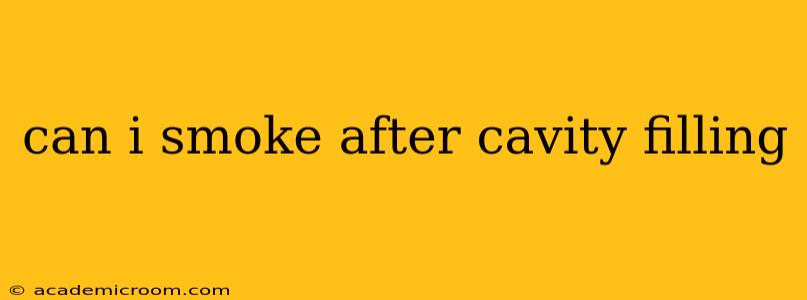Getting a cavity filled is a common dental procedure, but recovering properly is crucial for preventing complications and ensuring the filling's longevity. Many patients wonder about the impact of their lifestyle choices on the healing process, particularly smoking. The simple answer is: no, you should not smoke after a cavity filling (or any dental procedure, for that matter). Smoking significantly hinders the healing process and can lead to serious problems. Let's delve deeper into why.
Why Smoking After a Cavity Filling is a Bad Idea
Smoking interferes with the healing process in several ways:
-
Impeded Blood Flow: Nicotine in cigarettes constricts blood vessels, reducing blood flow to the gums and the area where the filling was placed. This reduced blood flow means less oxygen and nutrients reach the site, slowing down healing and increasing the risk of infection. Proper blood flow is essential for the body to repair the tooth and the surrounding tissues effectively.
-
Increased Risk of Infection: Smoking weakens your immune system, making you more susceptible to infections. After a filling, there's a small risk of infection at the site. Smoking dramatically increases this risk, potentially leading to complications like dry socket (in extractions) or inflammation around the filling.
-
Delayed Healing and Increased Pain: The combination of reduced blood flow and weakened immunity contributes to a slower healing process. This can mean prolonged discomfort and potentially more pain than necessary.
-
Compromised Filling Longevity: The healing process affects the bond between the filling and the tooth. Smoking can weaken this bond, potentially leading to the premature failure of the filling and requiring further dental work down the line.
-
Increased Risk of Gum Disease: Smoking is a significant risk factor for gum disease (periodontitis). Gum disease can cause tooth loss, and having recently had a filling makes your teeth even more vulnerable.
What Happens if You Smoke After a Filling?
While you might not experience immediate, drastic consequences, the risks mentioned above become more likely the more you smoke. You might experience prolonged discomfort, increased sensitivity, or a higher chance of infection. In the long run, smoking will reduce the lifespan of your filling, potentially costing you more money and dental visits in the future.
How Long Should You Wait to Smoke After a Filling?
Ideally, you should avoid smoking entirely, not just for a short period after your filling. However, if you are a smoker and absolutely cannot quit, at least wait until the local anesthesia wears off and the bleeding has stopped. This typically takes a few hours. But again, quitting smoking is the best option for your long-term oral health.
What Other Things Should I Avoid After a Filling?
Besides smoking, it's essential to follow your dentist's post-operative instructions, which might include:
- Avoiding hard or sticky foods: These could dislodge or damage your new filling.
- Gentle brushing and flossing: Be careful not to irritate the area around the filling.
- Using pain relievers as prescribed: This helps manage any discomfort.
- Monitoring for any signs of infection: Contact your dentist immediately if you notice swelling, persistent pain, or any other unusual symptoms.
Can Smoking Affect Other Dental Procedures?
Yes, smoking negatively affects the success and healing of virtually all dental procedures, including:
- Dental Implants: Smoking significantly increases the risk of implant failure.
- Tooth Extractions: Smoking elevates the risk of dry socket and infection.
- Gum Grafting: Smoking can hinder the healing and success of gum grafting.
- Root Canals: Smoking can compromise the outcome of root canal treatments.
In conclusion, protecting your oral health and the longevity of your new filling requires careful consideration of your lifestyle choices. Avoiding smoking is crucial for optimal healing and preventing potential complications. Talk to your dentist if you have any questions or concerns about your smoking habits and their impact on your dental health.
